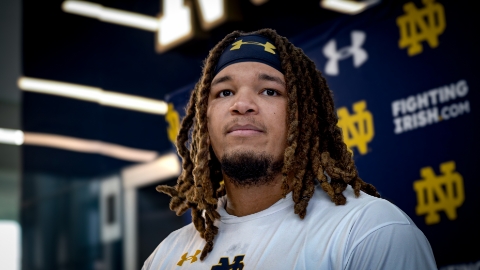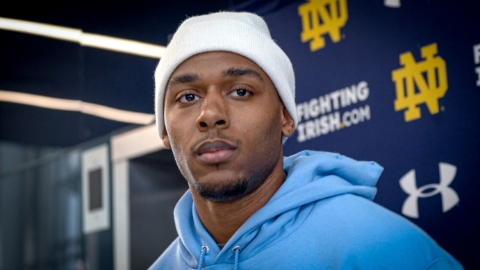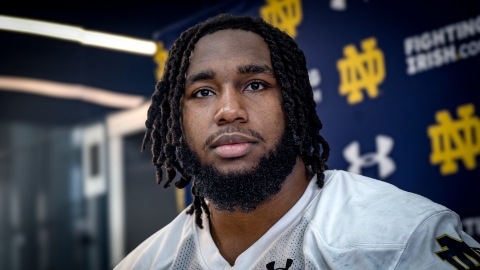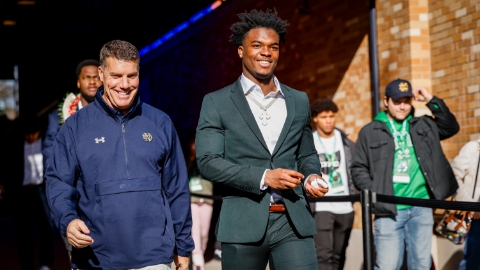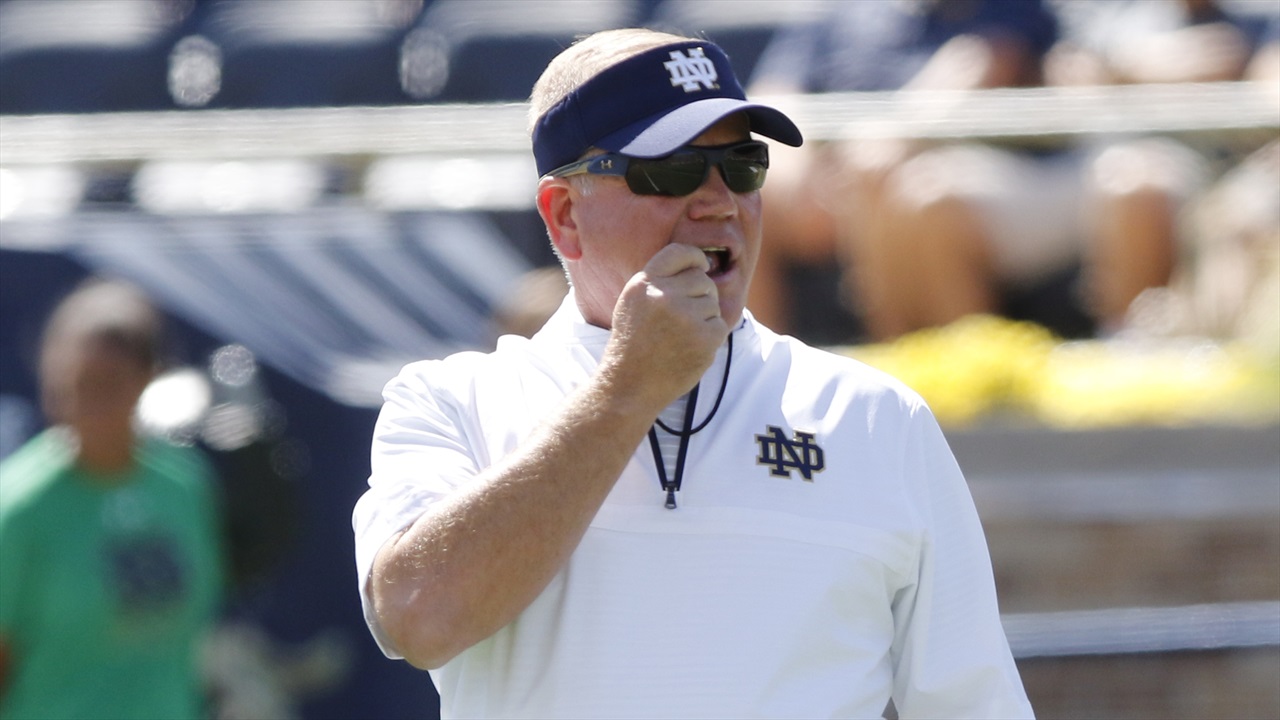
BRIAN KELLY: Good afternoon. Another great challenge for our football team this weekend, University of Georgia. Certainly have a great deal of respect for Kirby Smart, and certainly know him from his days at Alabama when we played them obviously in the National Championship game. Experienced coach, has done a great job at Georgia. He's got a great staff, coach Chaney, Coach Tucker. So first and foremost we've got a well-coached football team coming into town, a talented football team.
Offensively, I think you clearly get the sense that this is, you know, a Georgia to be team that wants to feature two outstanding backs, Sony Michel and Nick Chubb. They are elite backs. I mean you're going to see two guys that will be NFL players and have great careers. So two elite backs. Big offensive line. Wide receivers are quality and have the ability to make plays down the field. Depth at the tight end position. And of course, everybody wants to talk about the quarterback position, but I really like Jake Fromm. You know, I think everybody says, well, he's a freshman, and you know, he's only had a couple of snaps. But look, I'm not an expert, but you know, I've been in this game a while, and he's got a presence about him, and he's very comfortable running the Georgia offense. So we go into this game expecting a guy very capable in Jake and running their offense and doing the things necessary to be successful. So again, the narrative might be that Eason is out, and ^ he's a fine quarterback certainly, but I think they're in very capable hands. He'll do a great job for them. And they're going to feature two elite backs from an offensive perspective.
Defensively, I think the thing that stands out there, you know, certainly Kirby's fingerprints. Mel is running the defense but you can see Kirby's influence there as well, which you would as a head coach. But depth and versatility, I think those are the two words that come to mind with their defensive line. You could look at nine guys that I've evaluated and our staff has evaluated that are all very good players. Really love Thompson in terms of his ability to stop the run. He's a good athlete, good quickness. He's got a lot of tools. Atkins, obviously, but there's so much depth on that defensive line, and there's great versatility within their three down team. They can play three down; they can play four down. They can give you multiple looks, and they just do a great job.
Roquan Smith, I think he's an elite player at the linebacker position. Change of direction, just a fast-flow middle linebacker, again, another elite player on their defense. But they're extremely athletic. I think they returned, I think, 10 starters on defense off a very good defense. And again, versatility and great depth on their defense, and especially in their front seven.
On the back end, you know, Deandre Baker, great cover guy. They are a little bit banged up on the back end, but they're going to have some guys that are going to be able to fill in, and it looks like they're getting some guys back on the back end. But Davis, it looks like, is going to get back. You know, McGhee, Lecounte, all of these guys. Sanders has got 12 career interceptions. So there's plenty of depth on the back end of their defense, and again, I think it starts with Baker who is a really good cover guy. So depth, versatility on the defensive end; very physical athletic defensive line front seven; and certainly very solid in the special teams game. So great challenge for us here at Notre Dame. We're excited about the challenge.
You know, this is the great part of being an independent football team in that you get these kinds of games, getting a chance to play against a team that's regarded as one of the very best in the SEC. So our guys are excited about the challenge and looking forward to Saturday night. So with that, questions?
Q. Brian, any update on Alohi Gilman, Micah Dew-Treadway and Durham Smythe?
BRIAN KELLY: Alohi's appeal has been denied. So we have put that one to the side and we'll move forward. And again, Alohi will be obviously eligible next year, and we're excited about his involvement in our program. But that is now something we can move forward with.
Micah Dew-Treadway will practice today. Had a great day in the weight room yesterday. So we feel like he's ready to get out there and compete for us.
Durham Smythe is progressing quite well. He'll be out at practice today in a non contact format, and if he does well today, we'll initiate him to the full status. So he's doing quite well.
Q. The run blocking got a lot of attention on Saturday. I'm curious what your evaluation was of the pass protection from the offensive line, running backs and tight ends.
BRIAN KELLY: You know, I think what you would expect is that we've gotta continue to get better in all phases of what we're doing, run and pass blocking. We don't see that there's any glaring weaknesses. We have a young player at right tackle, whether it's Kraemer or Hainsey, but they battle quite well there. But we don't leave the evaluation going, you know, we've got some major issues in pass protection. There were some things through our quick game that we're better if we handed the football off. But screen game we're a little too quick in getting out. Boots, we've gotta be a little bit more secure off the edge. The things that we'll take care of more than anything else is the unwarranted hits on the quarterback, things that we can control. The physical pieces of offensive linemen in terms of their growth, we feel really good about that and they're going to continue to get better. There were things that happened on Saturday that we can control in coaching and teaching to take some of the hits off our quarterback.
Q. I know that when people kind of talk to you when schedules and season, you just say hey, I go where they tell me. But I think in the past you've had some input with Jack when you've talked about future schedules. How much input did you have about getting these SEC series going, Georgia, Arkansas, Texas A & M, wanting to have SEC teams on your schedule?
BRIAN KELLY: Well, we felt that that geographical representation and certainly, you know, putting this game together as an independent, when we went to the new format, our regular-season schedule has to stand up against teams that are for the most part playing 13 games. So again, you may say, well, some of those are really playing 12 because you can take the 1AAs and take them right off their schedule. And I think many do. But it has to have this kind of strength of schedule for it to stand up. And we think it does. So those conversations were about how do we best balance it without it being too strong of a schedule to sustain itself throughout the entire year, and this game fit pretty good in that balance.
Q. Last one from me, you've played two really talented SEC teams, I believe, in your time at Notre Dame, the Alabama game in 2012 and the LSU team in 2014. What was your big takeaway from playing them? I mean was there anything that you walked out of those games and said, I want to take something from this and use it in the way I build my teams?
BRIAN KELLY: Not particularly. I think you walk away from those games, and you certainly know that the talent level that you're going up against. But you also know that it still comes down to your preparation and execution and that you're capable of beating those teams. Certainly we weren't capable of beating Alabama that day. But we did against LSU. So I think the takeaway is that your preparation and execution, you can beat, you know, with a Notre Dame football team anybody that you play.
Q. I'm curious, I know you guys recruited Jacob Eason obviously, but you talked about Fromm. Did you guys have any recruiting involvement with him at all?
BRIAN KELLY: We didn't. But I see all the quarterbacks. And you know, we were already involved and engaged in another quarterback at the time. But I always liked his presence and his savvy. He always just seemed to be somebody very comfortable. He reminds me a lot of a quarterback we have, Ian Book, on our team. Just has that "it" as a quarterback.
Q. And what's really intriguing is this match up of your offensive line and Georgia's defensive line. Can you just expound a little bit on how you see that match up?
BRIAN KELLY: Well, certainly controlling the line of scrimmage. It has not changed as one of the key ingredients in success in college football, NFL football, wherever you want to go. And that will go a long way in determining who wins this football game again. Georgia's offensive line against our defensive line and vice versa. They're going to feature both their backs. We're going to feature our running game, and somebody's going to come out on top. So it's going to be an old-fashioned kind of find out who's got that grit and determination because somebody's going to have to find a way to run the football late and control the line of scrimmage.
Q. Lastly, Georgia hired Brian VanGorder for the last couple of games of last season as a defensive consultant. Do you think that figures in -- I mean is that a problem from, I don't know, information? I'm not sure what the protocol is about that. Does that concern you at all?
BRIAN KELLY: No. Brian's a professional in every since of the word. Even if he knew what we were doing offensively, you know, he would certainly stay within the guidelines of what professionalism is. He's the consummate professional.
Q. Brian, you guys obviously did a lot of things right on Saturday. What do you hope or think you'll see in terms of the biggest improvement from week one to week two?
BRIAN KELLY: Well, I just still think fundamentals have to get better. We've gotta tackle better. There's no question defensively. That will start with in all phases of our tackling. I told our football team situational awareness has to get better. We had some situations where we've gotta react quicker, screen game, for example, our situational awareness wasn't great. We backed up in the end zone on a throw. We gotta know where we are on the field. So some fundamental things, and then some situational awareness, I think, has gotta get better.
From an offensive standpoint, I think just, you know, consistency on first down. We were behind the chains a little bit too much on first down, and so we've gotta get a little bit better there. But all in all, it's still about that, for our players, the details and just staying focused and locked in this week in their preparation. If they do that, we'll see great improvement this weekend.
Q. And then you obviously play a lot of players on defense. Would you expect around the same number and the same frequency of substitutions against Georgia?
BRIAN KELLY: Yeah, I think I mentioned in my teleconference yesterday we had 24 players play 10 plays or more. We'll be in that neighborhood again. I think we were somewhere near that offensively, including special teams. You may even see a little bit more offensively. We think that we've settled into some decisions from an offensive standpoint. We did play five tight ends with Brock playing right, playing some fullback. So yeah, you'll see, I think we had 54 players play in some fashion, and I think you'll continue to see that trend.
Q. So follow up on that, of the first-time players that you had out in the game on Saturday, who stood out on film to you?
BRIAN KELLY: Well, there's true freshmen and then there's first-time players. First-time player, I thought Brandon Wimbush as a first-time player, first-time starter was pretty good. You know, true freshmen out there, you know, Myron Tagovailoa was pretty good. He was explosive, did some really good things. So it really just depends on how you kind of look at that. Isaiah Robertson on special teams was really good as a true freshman. So I thought there were some nice things from first-year players, and I thought there were some nice things from Tony Jones, you know, as a first-year player. And then some true freshmen were able to show themselves. Kurt Hinish played a lot of football. I thought he learned a lot in his first start, got a lot of action. So some really good things with first-year players and some true freshmen.
Q. Then to clarify on the unwarranted hits on the quarterback comment that you made, how much of that is on Brandon and how much of that is on the line?
BRIAN KELLY: Well, you know, Brandon is going to run. You know, certainly we would like to see him take the knee and slide a little bit more when necessary or when it's prudent to do so. But we don't want to take away his ability to be an athlete as well. But I think he'll grow into that. We didn't do a very good job on some pressures where he should have handed the ball out instead of trying to make a throw or on a couple of boots where we released too quickly and should have held up an end. So it's a little bit of everybody doing a better job across the board.
Q. And then clearly, tackling was one of the aspects that you focused on during the pre-season camp. Evaluate your team's tackling on Saturday.
BRIAN KELLY: It can get better. It can get better. I thought for a first game we held on to some tackles. We'd like to be a little bit better in terms of positioning on our tackling. You know, I think, you know, when you're in that first game and it's a little faster, your aim is a little off. So I think we'll be a better tackling football team in week two.
Q. With Kirby Smart's defense, what are some of the traits that jump out to you that are consistent from maybe what you saw at Alabama? They seem big in terms of size, but -- and interestingly the tackle for loss and sacks last year were not all that elevated. So what are his defenses about?
BRIAN KELLY: Well, you know, two four Is, so they like to play the four I defense, which causes some problems with your schemes and combinations. Two gap noses. They like to move the fronts around, which causes some problems up front for your combinations and schemes. So frees up linebackers to run and hit. So what is it about his defense is that when you have four linebackers, you've got guys running off edges. They can get to you off the edge as well as moving the front around. When you're in three down, you can easily play three down and four down from week to week. So there is that ability to morph to what you want to be from week to week. And I think that that in itself allows him a lot of creativity from week to week.
Q. And who's the biggest -- is that a bigger challenge for a young offensive lineman like Tommy or Robert or is that a bigger challenge for a young quarterback like Brandon just in terms of identification?
BRIAN KELLY: Well, I think it's more on the quarterback, yeah, in recognizing how they lineup, is it three down, four down, is that a shade or is that truly a nose. You know, the coverages are going to come to him based upon rotations and safety movements and such. But yes, the recognitions of the fronts become a little bit more in depth relative to your film study for the quarterback.
Q. Te'Von Coney, the off-season that he had, what he delivered on Saturday and how this week maybe suits him as more power, maybe a 22-personnel as some of the guys noted last week.
BRIAN KELLY: Well, I don't deny that. Certainly his physicality and his strength is certainly there. What has changed in Te'Von is his traits. I'll give you the example. You know, last year the back goes away, he probably follows the back and doesn't blitz up the edge. But his attention to detail. He's locked in. He does his assignment, and we cut the tight end loose. Right? If he doesn't do his job, they're going to find that tight end, and so he covers up for a mistake on a play. We were covering up for his mistakes last year. So it's not just the physical talent. He really had that in a large degree. Where he's taken the huge jump is in his traits. His attention to detail, his focus, he is a locked-in football player. And that's where he's making the jump.
Q. How much do you think of what happened with August and the arrest affected that and maybe fast forwarded, okay, I gotta get this together with him?
BRIAN KELLY: Look, everybody has to make choices about, you know, where they want to be. All of our players knew that they were going to be rewarded for their traits, not their talent. And he made a choice that no matter how good he looked and how many abs he had and how big his biceps were, he wasn't going to play unless he had the traits. And so he made that choice, and that's why he's going to see success this year.
Q. I believe Nick Watkins was rarely challenged on Saturday. They were going more towards Julian's side. Was that more a by-product of what Nick was able to do, locking down on that boundary side, or just a game plan scheme for them?
BRIAN KELLY: You know, there's a lot of reasons. Sometimes it's -- you know, the coverage -- look into the short field you can get into a lot of half coverage scenarios where you don't want to go there. You get a lot more quarter coverages to the field which prompts more throws. I thought their game plan was outstanding to take the kind of throws that weren't challenges much, and the quarterback was smart in terms of what he did with the football. He didn't put them in some challenging positions. But yeah, I think Nick did a very good job, don't get me wrong, but I wouldn't read too much into it that he's, you know, locked down corner. There's no locked-down corners in football. They all can get beat. But I think it's just the circumstances a little more than anything else that, you know, he only had a couple of attempts his way.
Q. Was there a concern maybe that they were challenging Julian a little bit more?
BRIAN KELLY: No. The ball is going to go out there a lot more in the kind of coverage situations that we had and the type of coverages that we were in fact playing. So you know, Julian, we have a lot of confidence in him. That's why he is to the field. But again, I think by and large Julian was in pretty good position other than the one touchdown, he's just gotta go make that play.
Q. You talked a little bit about Te'Von Coney, greater focus. It seems that was the most active also that Jay Hayes was in a while. Is it a similar situation with him as far as progressing with those areas of attention?
BRIAN KELLY: It's actually -- there's no question that he has matured in both on and off the field. But his is different. His has been in correctives in the weight room and mobility and his agility and his footwork. Look, this is a big, strong football player. He's 285 pounds. And he needed to match that strength and size with his footwork and change of direction. He committed to that in the off season. Our strength staff did a great job. Rob Hunt and the trainers did a great job on correctives with his footwork and his feet in particular to get him where his change of direction now matches and meets his physicality. That always lagged behind with Jay. Now it matches who he is and that's why he's having the success he's having.
Q. And I know you did recruit Jacob Eason. He doesn't seem to fit the prototype of that dual threat. Are you still open to having the pure pro pocket passer; whereas, somebody like Brandon Wimbush and Malik Zaire and DeShone Kizer, they can beat you with their feet as well? Do you place a greater importance on that in recruiting quarterbacks?
BRIAN KELLY: Yeah. I think I've said this many times. I don't buy into the dual threat pocket passer kind of deal. I mean I just have never -- I know you guys live in that world. I don't. I want a guy that has escapability and ^ mobility. If you can run some zone option and keep the defense honest, I'm good with that. He doesn't have to run for 150 yards. He's gotta be accurate. He's gotta be able to make all the throws, but he's also gotta be able to run your offense. If he's got escapability and he's Mobile to keep defenses honest, you can call him whatever you want. Eason can do that. So I don't pigeon hole them in that sense. So I think there's a lot more crossovers. I think there's a number of guys that are out there right now that are called one thing that I see as something else. So I just don't subscribe to it in the manner that maybe some others do.
Q. You guys had 11 tackles for loss on Saturday. That's more than double what you had average last year. Mike Elko was brought in here, and that's part of a trademark of his defense is his tackles for loss. How do they come about? You don't blitz that much. Is it blitzing? Is it technique? Is it effort? What about that makes it into Mike Elko's defenses all the time?
BRIAN KELLY: Well, I think it's the philosophical approach to how we teach the defensive front and the way that it is taught from the very first day that the defense is put in. We're not a read and react defense. We're going to create a new line of scrimmage. So it's all those tenets. It's not just one thing. You know, the defensive line is going to play in a manner that they're going to get off the football. Our linebackers are downhill players. And you can see that with 10 or 11 tackles for loss, 10 from different players, we activate everybody, safeties, corners, everybody's involved in the run fits. So it's a comprehensive philosophical decision to get the offense behind the chains. And so it's not just one thing. It's a philosophical decision.
Q. Just to follow up on one quick thing, it doesn't necessarily mean a lot of blitzing?
BRIAN KELLY: No, it does not. As a matter of fact, there wasn't much blitzing at all. It's just the way the defense is taught from day one in how we're going to attack the line of scrimmage.
Q. And I guess the ^ last is maybe the most obvious in how important is that, especially with a guy like Chubb and Michel, guys who once they get going, the importance of sort of getting them stopped before they get started so to speak?
BRIAN KELLY: Well, they're difficult to tackle one on one at the second level. So listen, if you let these guys go through to the second level and you're relying on your safeties one on one from 12 yards off to make tackles, they need to be of NFL pedigree to make those tackles consistently. And I don't know that they will because these two kids are extraordinary talents. So we need a close space, get down closer, and those are some of the hallmarks of a coach's defense.
Q. You guys ran the ball very successfully this past Saturday. Could you kind of categorize why you were able to do that, and you're obviously not going to have three guys run for 100 yards every single game but what did you guys do well last Saturday that maybe you can duplicate every week in the run game?
BRIAN KELLY: Similar to the question that was just posed, when Mike Elko came on campus, the first thing he talked about was creating a new line of scrimmage, tackle for loss and ball disruptions. Chip Long was the same way. Chip Long was talking about a physicality and a demeanor in running the football. It wasn't about how many yards we were going to amass in total offense. It was about how we were going to exert our will in terms of running the football. So this is really just more about creating a mindset and building on that mindset. Look, we're in Game 1, okay. We have to continue to build on this mindset. But it started in January. It didn't start in August. And it's been the same message that these guys have heard every day. It's been demanding, not demeaning, and we're going to continue to demand that new line of scrimmage defensively, taking the football away defensively, and from an offensive standpoint, a mentality, a toughness in terms of running the football.
Q. You spoke pretty highly of Fromm, but what are some of the things that you can do to try and make a young quarterback uncomfortable, particularly when you're the home team?
BRIAN KELLY: Make them win the game. Put the pressure on him; right? I mean take away all of his tools. I don't know. I mean it's just -- when it comes to -- somebody asked the question about what are the keys to stopping a freshman quarterback. I don't know what the keys are. I mean you have to run your defense, do the things that you do. I think he's very comfortable running any offense. He looked very comfortable playing the game to me. You know, he's going to get the ball out of his hands. If you watch his quick game, he takes a great rocker step, gets the ball out of his hands. He threw some balls where some people perceived to be up for grabs. I thought he put them in position where his guy was going to catch it and that was it. I think he's a good quarterback. So we gotta defend him and we got two really good backs. So we know we've got a challenge when it comes to that. But we've gotta be able to -- obviously if we give him one look the whole time, he's capable of hurting us.
FastScripts Transcript by ASAP Sports
